Hedwig and the Angry Inch: A love story that broke taboos
The cult film Hedwig and the Angry Inch was released 20 years ago. Leila Latif explores the enduring revolutionary power of an unlikely love story.
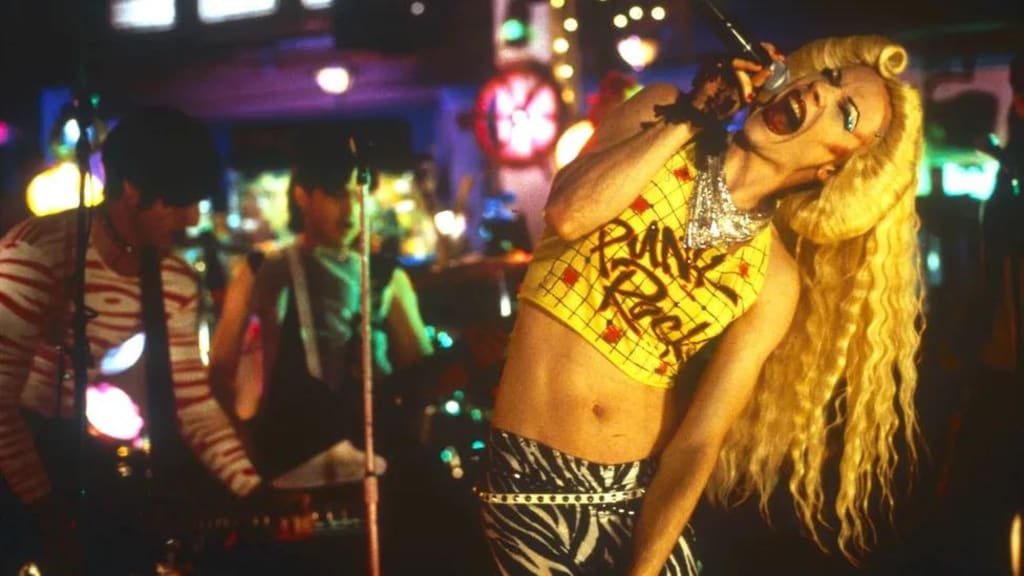
Like watching the Moon landing or the moment they locked eyes with the person they love, people remember where they were the first time they saw Hedwig and the Angry Inch. The queer punk-rock musical about Plato, the Berlin Wall, love, gender, fame and self-acceptance started first as a stage show before becoming a much-loved cult film with a fervent fandom of "Hedheads" that unwaveringly adore it. Twenty years since the movie was released and 27 since John Cameron Mitchell and Stephen Trask first debuted the character at New York nightclub Squeeze Box, Hedwig has been a constant presence, being screened and performed all over the world.
The story centres on Hedwig, a singer in a punk-rock band from East Berlin now living in Kansas following botched gender reassignment surgery that left them with an "angry inch". Hedwig has their heart broken twice, first by the GI who coerced them into the operation to allow them to marry and emigrate, and then by Tommy Gnosis, who fell in love with Hedwig but then stole their songs and used them to become the rock star Hedwig always wanted to be. It's a tale that many have a deep connection to, not just because it's hilarious, heart-breaking and has a phenomenal, timelessly cool, soundtrack but also because it taps into the fundamental question of identity and how it's shaped by the relationships we have.
Stephen Trask, co-creator, composer and lyricist of Hedwig, has seen that intense connection first-hand during theatrical performances, telling BBC Culture, "From the stage we would see couples break up and other people would come and get engaged. People would make life choices watching the show". For Trask that's evidence that Hedwig's enduring appeal is in its universal themes. "There's a lot of soul searching that Hedwig does about looking for a romantic partner and trying to find wholeness and be recognised for their music and their creativity; it's not just a gender journey. John and I were very much talking honestly about our own journeys and expressing them through this character that in many ways, most of our audience didn't have a lot in common with. But the story is so human and fundamental that people can figure out by watching if they are on the wrong path or the right path."
Story continues below
I revisited it constantly because it felt to me more romantic and had more to say about love than films that were sold to me as love stories – Anna Bogutskaya
For Anna Bogutskaya, film programmer, broadcaster, writer and proud owner of a Hedwig tattoo, it spoke to her most as a love story. "I thought it was incredibly romantic. I thought of it always as a love story, of heartbreak and really intense true love. I have revisited [the film] constantly because it feels to me more romantic and has more to say about love than films that were sold to me as love stories. It's a film that I weirdly haven't shared with many people, it feels extremely intimate to me." That intimacy extends both ways, with Trask feeling closely bonded to the fandom: "Whenever I meet a fan, I think, 'oh, that person could be my friend in real life'. And I have developed friends who started off as fans and John has the same experience." The fandom extends outside of the LGBT+ community or punk rock fans to people from all walks of life. "Recently, a young woman came backstage and told me about her mother, a refugee from El Salvador who in the early 80s trudged through all of Central America on her own to come to the United States illegally. She lived secretly and got herself a teacher certificate, becoming a high school teacher. [The Hedwig] song that gave her strength was Wig in a Box and she would say: 'I am Hedwig'."
The path to creating Hedwig began with, of all things, a biography of a New German Cinema icon. Hedwig's co-creator, original star and director of the film John Cameron Mitchell tells BBC Culture, "I wanted to write a musical that was rock and roll with a punk edge, I'd seen a lot of so-called rock musicals that didn't feel authentic and I knew that the myth of the origin of love from Plato would be the central metaphor. I had a few characters I was thinking about and I met Stephen Trask on a plane. Stephen was probably coming on to me and moved to one seat away and plopped a Rainer Werner Fassbinder biography on the seat between us. It's probably never happened before or since that Fassbinder was an ice-breaker."
After going to see each other's work, a creative partnership was formed and the characters began to emerge. "I would tell Stephen stories about my life. One of them was about a babysitter I had, Helga, a German army wife who I realised in retrospect was also a prostitute. She became the seed of Hedwig and Tommy came from me as the son of a general. Stephen was the house band leader at Squeezebox so drag queens would do punk-rock covers with him. That's where I did my first gig – because it was a drag club, I had to do the female character, Helga, who became Hedwig."
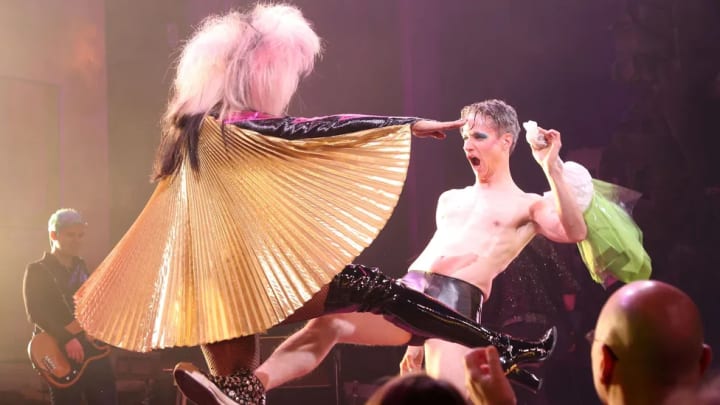
Once the story had been formed and the songs and lyrics written, the path to success for Hedwig and the Angry Inch was not an easy one and, much like the character, Mitchell and Trask struggled to find an audience, performing it in tiny venues or in the early hours of the morning. Even when, with the help of director Peter Askin, Hedwig made it to off-Broadway, the audience didn't immediately find them. "People stayed away in droves," Mitchell laughs. "We often had very silent audiences, but it wasn't until people who didn't like musicals started coming, and celebrities like Glenn Close, Patti LuPone, Marilyn Manson, Barry Manilow, Lou Reed and David Bowie started coming, it became the thing to see. Even though we were never a big hit, we became the hip thing. Then there was a bidding war for the movie, which was shocking to us. New Line [who ended up producing it] was one of the few companies run by one person, Bob Shaye; he was getting ready to do Lord of the Rings and allowed me to make the film the way I wanted."
One of the most impressive things about the film they would go on to create is how, as Bogutskaya puts it, "the film uses cinematic language quite uniquely and uses the medium that it's in to its full extent. It's not just trying to film the show or replicate it." The film creates a larger landscape to explore Hedwig's journey but also recreates the atmosphere of its early days as an electrifying live performance. It premiered at Sundance in 2001 to a rapturous reception, winning a prize for Best Director and the much-coveted Audience Award.
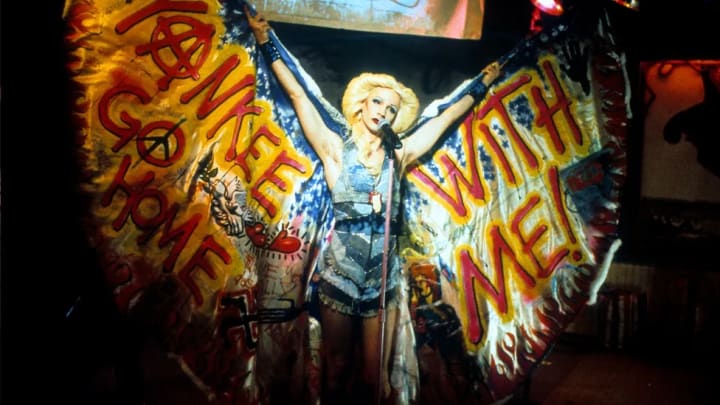
But, amazingly, it was while the Hedwig team were still at Sundance that things started to go wrong for the film. "We were in a weird spot because there was a changing of the guard at New Line while we were at Sundance. All of our producers were fired." Trask remembers. "We were walking down the street at Sundance when our producer got a phone call from the new head of production who said, 'Hey, I just want to congratulate you on having this big success with Hedwig. I still need to tell you that, despite that, if I had been in charge then like I am now, this movie would not have been made and you're fired' – she was literally fired while walking down the street with us. The new people in charge actively hated the movie so we had to depend entirely on free publicity, which meant getting into every film festival possible. We did dozens, if not a hundred, film festivals and we were huge hits at all of them – but by the time it came out, we had been at so many film festivals that tens of thousands of people had already seen it. And then when we were getting ready to do our expansion, very sadly, September 11th happened and everyone stopped going to the [cinema]."
So, despite awards and critical acclaim (Hedwig currently has a rating of 92% on Rotten Tomatoes), Hedwig was declared a flop. And it was not until the DVD release that its audience began to grow. Hedwig DVDs were passed around friend groups, watched on date nights and played at parties. Much like in its original theatrical incarnation, word of mouth and its intriguing hipness brought Hedwig to a whole new group of people who would then attend singalong screenings in Hedwig's signature giant blonde wigs.
Hedwig was revolutionary, a beautifully realised story with a gender non-conforming punk rocker in drag, that sees its central character as fully human and deserving of love
Hedwig was, for many people, quite unlike anything they had seen before. Most portrayals of gender non-conformity had either been mocking like those in Glen or Glenda, Life of Brian, and (worst of all) Ace Ventura: Pet Detective or terrifying, as in Psycho, Dressed to Kill, The Silence of The Lambs and Sleepaway Camp. The arguably more insidious alternative are films like Boys Don't Cry, All about My Mother, Bad Education or The Dallas Buyers Club which Trask describes as "'give me an Oscar' movies where some very pretty straight actor… [is dressed up] to act out the pain and the trauma [of a transgender or gender non-conforming character]." Compared to those films, Hedwig was revolutionary, a beautifully realised story with a gender non-conforming punk rocker in drag, created and performed by queer people, that sees its central character as fully human and deserving of love.
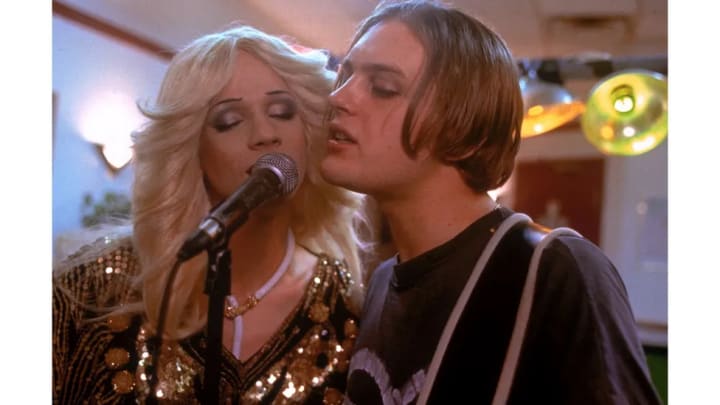
The film was inarguably ahead of its time and able to make distinctions between gender, sexuality and drag in ways that mainstream culture is only now catching up with. For Diversity and LGBT inclusion specialist Yassine Senghor, the power of Hedwig is how it taps into the difficulty of defining yourself when no one label fits. "The film is not necessarily specifically depicting what the journey is like for everybody, it is very personal to Hedwig, but I think it highlights that confusion of when you're in a space where there isn't necessarily language to define yourself." That is distinct from the drag that Hedwig performs, but Senghor thinks that the power of drag is also at the fore. "It highlights that drag is not necessarily an exploration of identity but has the power to subvert gender ideas, to poke fun of them and question the status quo."
Shifting identities
Of course, as times change and the world progresses, drag and gender non-conformity has become much more accepted; but certain elements of Hedwig have become more controversial. Lillian Crawford, a culture writer whose podcast and newsletter Listen to Lillian explore representations of gender in British film, watched the film recently and while she found plenty to admire ("the songs are so good!"), other elements sat less comfortably. "There's this sinister almost fetishisation of her body by the GI who finds her and also her mother, which sort of buys into the thesis that trans people are only trans because their parents wished that they were another gender when they were born. Trans representation before and since [the film] has focused on kind of a traumatic event that makes you trans." (The film implies Hedwig was abused by their father as a child.)
But for its creators, Hedwig isn't a trans story. "I can say almost certainly we never used the word trans while writing," explains Trask. We were telling the story of a person and we were interested in dualities in general and the gender duality was one of them, but it was just part of what made Hedwig." Hedwig, back when they are Hansel, is seen exploring gender before being coerced into the surgery and when, later in the film, Hedwig sings Wig in a Box they are empowered by feminine expression, but the film ends on Midnight Radio where Hedwig finds strength and self-acceptance by stripping away all the artifice. "The drag is removed at the end," says Mitchell. "The character's now naked saying, 'OK, this is me, call me what you want… Meet my gender of one, I will no longer be labelled'." Reflecting on the way Hedwig has aged, he adds: "In terms of gender, things have definitely changed for the better. I've never been a much of a label person, but I know it's very important when you're young. It was very important for me to come out, it's very important to say what you are and then as you get older, you forget what you are. You can barely remember your phone number but occasionally you're reminded that these categories are important to people."
When Trask was writing Hedwig, he wanted to explore the fallacy of the gender binary. "When I was writing Tear Me Down, I was very interested in using the Berlin Wall metaphor. The song names these different binary dualities like man/woman, top/bottom, slavery/freedom, communist/capitalist. In the post-wall period, there was this genuine searching among countries who could no longer define themselves as being aligned with Russia or aligned with the US. Who are we without this wall? I was trying to say there isn't much of a difference between a bridge and a wall, they're both human constructions. The Berlin Wall was the same way that gender is – the division between men and women and what that signifies for who people are as people is a human construction. We're taught to believe that gender is immutable but it can come down."
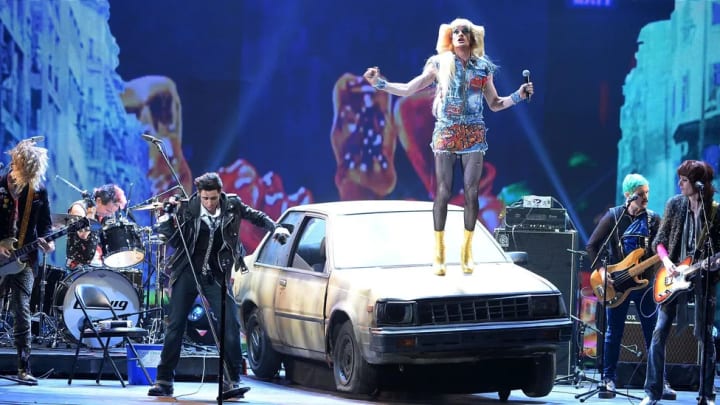
Even 20 years after its release, its cult popularity hasn't waned. The 2014 Broadway revival was a hit, running for 529 ecstatically received performances and winning Tonys for Best Revival, Best Lead Actor (Neil Patrick Harris), Best Actress (Lena Hall) and a Special Award for John Cameron Mitchell who returned to the role for a stint. The production then went on a successful tour in 2016 and 2017. As well as being "the first time we actually made money from Hedwig!", according to Mitchell, it showed how far the culture had come – it was no longer too shocking to have Hedwig on Broadway.
As for the future? Trask and Mitchell hope others will continue to discover the film and to put their own spins on Hedwig performances, adding their local humour, playing around even more with the genders of the actors and characters, and keeping Hedwig edgy and subversive. The actress Lena Hall, who played Yitzhak on Broadway, went on to play Hedwig on tour. Mitchell will be strapping on that giant wig again and doing an international tour of the songs from the musical interspersed with stories called The Origin of Love, and is planning to make a documentary about the show. "I used to be a tour de force, now I'm forced to tour! But it's very gratifying and I love that people still connect so strongly to Hedwig."
About the Creator
Copperchaleu
The most charming woman I've ever met.


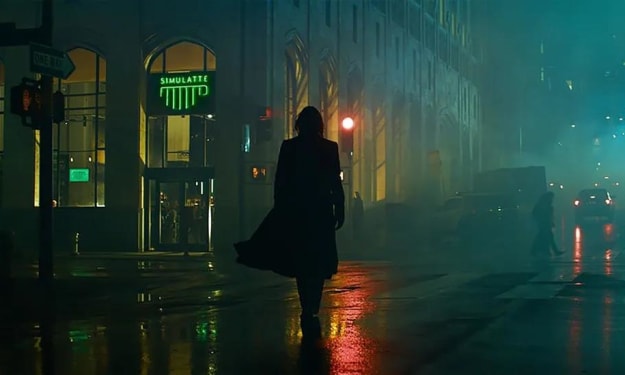



Comments
There are no comments for this story
Be the first to respond and start the conversation.